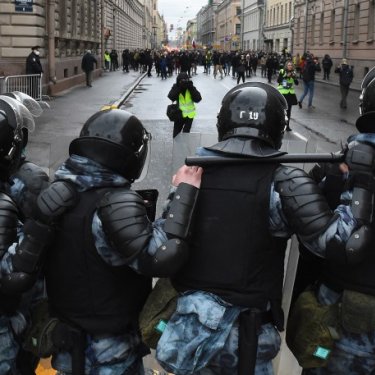Let Russian journalists cover demonstrations, RSF says after latest pro-Navalny protests

Despite measures supposedly designed to limit arbitrary arrests of journalists, at least ten were arrested during demonstrations across Russia on 21 April in support of Kremlin critic Alexei Navalny, who has been on hunger strike since 31 March. Reporters Without Borders (RSF) calls on the authorities to order the police to let journalists do their job.
Читать на русском / Read in Russian
The interior ministry had asked media outlets to provide the details of reporters covering the protests in order to be able to “guarantee their safety.” At the same time, the authorities are planning to issue reporters covering protests with specific accreditation or a badge with a QR code so that the police don’t arrest them.
These measures are being considered although Roskomnadzor, the federal communications agency, has said since January that reporters covering a demonstration should wear a “Press” vest and a badge and should carry both a press card and a letter from their editors saying they have been assigned to cover it.
These instructions did not prevent reporters being arrested on 21 April even when they complied. Gleb Merkin, the business daily Kommersant’s correspondent, was arrested in Kazan, the capital of western Republic of Tatarstan, despite wearing a “Press” vest and badge and carrying a letter from his editors. After checking his documents, the police took him to a police station on the grounds that he was “not on the list.” He was finally dropped off at a bus stop after the interior ministry’s local press office interceded.
Sotavision news website correspondent Bulat Khairullin was arrested in the same city on the grounds that his editorial assignment did not specify the location where he would be reporting. His colleague from Voronezh, Fyodor Orlov, was lifted into the air and carried horizontally to a police van by the four policemen who arrested him although he was wearing a “Press” vest and was shouting that he was a journalist. Orlov, who continued to livestream from the police station, was held for a week after covering a pro-Navalny demonstration on 23 January.
“We are seeing a wave of pointless proposals supposedly designed to protect journalists at protests when the police already pay no attention to ‘Press’ vests,” said Jeanne Cavelier, the head of RSF’s Eastern Europe and Central Asia desk. “Furthermore, these measures are incompatible with the way newsrooms operate and cannot be applied to freelancers. We call on the authorities to give a clear and simple order to the police: let journalists do their job and cover demonstrations. And to limit the number of unjustified arrests, we also urge the authorities to punish and prosecute the police officers who arrest and manhandle them.”
Bariyat Idrisova, who reports for Mediazona, a leading online source of coverage of police and judicial abuses, was manhandled by the police officers who arrested her while she was filming an arrest in Makhachkala, the capital of the Caucasian Republic of Dagestan.
“One of them twisted my wrist, grabbed my hair and kicked me,” she said. They also took her phone and told her to delete what she had filmed. Her colleague, Yulya Sugueva, was taken to a police station in Makhachkala where she was falsely accused of carrying a placard before being released about two hours later.
Two reporters for the opposition news website MBKh Media in Siberia, Igor Golyato in Irkutsk and Andrey Novashov in Kemerovo, were also detained for two hours. Further west, in Ufa, near the Ural mountains, Artyom Suponkin, a reporter for the local news site UFA.RU, was taken to a police station after filming an arrest. He was finally released and given an apology.
As with the previous pro-Navalny demonstrations in January, police also carried out “preventive visits” to the homes of several journalists, including Novaya Gazeta’s Nikita Girin, Mediazona’s Nikita Sologub and Krasnoyarsk TV’s Vitaliy Poliakov. Mediazona reporter Olga Romashova and the Navalny staff’s social media manager were subjected to a heavy-handed search of their Moscow suburb home .
Russia is ranked 150th out of 180 countries in RSF's 2021 World Press Freedom Index.



